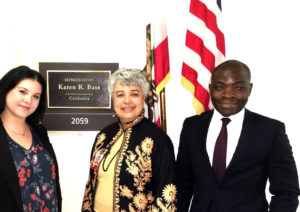The second day of the Lemkin Summit was largely focused on developing advocacy skills, in preparation for meeting with policymakers on the Hill. Because, as JWW’s advocacy director, I’m pretty familiar with this, the highlight of my day was connecting with my friend Joseph Mulala Nguramo, who was a presenter on one of the panels on the importance of involving local civil society of affected populations in advocacy work around genocide and mass atrocity prevention. The message of the breakout session was one JWW holds dear: local people are the experts on their problems.
Joseph believes that local civil society has a tremendous role to play in bringing about sustainable peace in areas ravaged by war and gross human rights violations. Born in the Democratic Republic of the Congo, Joseph has been in the United States studying and working for several years and remains a staunch advocate for a free, democratic Congo. The youth of Congo are the third generation since independence, and they have a very different view of the authoritarian kleptocracy that has gripped their country for so long. They are ready to put pressure on the government to be more accountable to the people.
Joseph talked about what it will take to bring about change in the DRC: the enforcement of rule of law in order to increase the people’s faith in the government; a quality government that is able to deliver human security, above all else; providing options for young people so they have a choice beyond turning to violence or being exploited; and, education, education, education. He also emphasized how vital U.S. engagement is for bolstering and energizing local civil society in the DRC. Every statement by an elected official on the situation in the DRC, every piece of legislation, whether or not it passes both chambers of Congress, has a tremendous effect on empowering the local population. It sends a message that their cause matters and that they are not invisible or inconsequential to the outside world.
This premise is why so much of JWW’s work is about bearing witness to and amplifying the voices of our local partners. We work to raise awareness of the realities on the ground and bring the needs and strategies of our local civil society partners to members of Congress. In this way, we embolden the efforts of some of the world’s most marginalized communities and work with them to maintain constant pressure on those in power who can no longer act as if the world isn’t watching. As Joseph likes to say, “always courage.”


